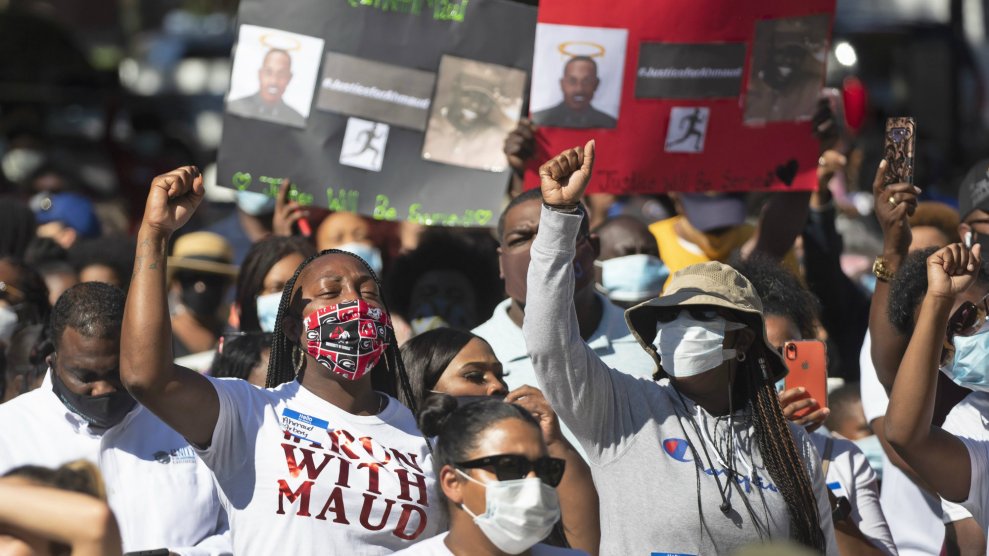
Mother Jones illustration; Getty
Over the past few weeks, a new hashtag has emerged on Twitter: #BlackintheIvory, a reference to being Black in the ivory tower of academia, which was first shared by two Black women in communications research. It has been posted thousands of times as the racial reckoning sparked by the police killing of George Floyd on May 25 spreads far beyond policing into industries like media, entertainment, food, tech, and more. Most of the tweets are from Black students, professors, researchers, and scholars sharing their stories of experiencing racism in the workplace and classroom: Getting passed over for jobs, or confused with maintenance staff, or called by the name of the one other Black person in their department.
Among the most widely shared tweets were those from Raven Baxter. “Raven the Science Maven,” as she is known on the internet, is currently the director of collegiate STEM (Science, Technology, Engineering, and Math) initiatives at a charter school in Buffalo, New York, the founder of science advocacy organization STEMbassy, and a musician whose rap music, she hopes, inspires other Black women in science. (Her music video, “Big Ole Geeks,” is a treasure.)
Here, in her own words, she recounts her time as a corporate research scientist at a drug company in western New York—a job she left in 2017 in part because of its toxic culture. Afterward, she went into academia as an assistant professor of biology at a community college, also in western New York, where on her first day a white co-worker threatened to call the police on her. Today, she is hopeful the uprising we’re seeing across the country will bring real, lasting change, including in higher education. Her story here has been edited and condensed.
I’ve always been into science. I was a very curious kid. I mixed together chemicals from around the house, like nail polish with sugar with baby powder, just to see what would happen. I excelled in the sciences in school. I eventually made my way to Space Camp, a week-long NASA program where we explored concepts in space and did astronaut training. And I went on a scholarship, which was even cooler because my mom was a single parent and couldn’t afford to send me at a cost. I was grouped with kids who came as far as Australia, who had come to America just to go to Space Camp. From that point on, I just decided that I thought science was so cool.
I went into a STEM-focused school for college, I got a biology degree, and I ended up getting a master’s in biology. I worked as a corporate research scientist for some time. I had some experiences there that really pointed me away from that field—just really a bad culture. So I decided to go into academia.
As I was finding my way, I didn’t always have super-positive experiences. I’m really fortunate to have gotten through my undergrad and my graduate career as a biologist unscathed. It wasn’t until I started working as a corporate scientist that I started to have major issues with not feeling accepted or welcome in science. And it was a huge shock to me. I wasn’t expecting it at all. Because up until I entered corporate, the notion was always, “You’re welcome. As long as you can do the science, you can stay here.” But when I got to corporate, it wasn’t enough. There was an even smaller box that I had to fit into for people to accept me. And it seemed like nobody really was going to accept me as is. Few people talked to me, and those interactions were very brief and rarely personal. People would go out to have their lunch breaks and I was never invited. It was very obvious that I was intentionally excluded from many out-of-office get togethers. I would make every effort; I was trying my best to make it clear, like, “Hey, I’m your friend. I want to be with you guys. Please include me.” And that was never the case. I was really depressed at the time because I’m a very social person. And when nobody is really like talking to you, it just feels like an empty space.
At my job, there were two other Black people. This is in a seven-story building. The security guard worked on the first floor; he was a Black male. And then there was me; I worked on the seventh floor. My lab hired a custodian who turned out to be the third Black person in the building. When he was hired, I don’t know why she said this to me, but my co-worker, she turns to me and she says, “Good, did you see the new hire? You won’t be the token Black girl anymore.”
I laugh now. I was literally crying when she said that to me. Nobody saw me cry. I just went back to my desk and—I can do a silent cry if I try really hard. No one had ever said anything like that to me. I grew up in suburbia—Williamsville, New York, which is an upper-middle-class neighborhood, not a lot of Black kids at my school. I went to predominantly white institutions for my undergrad and master’s. I’ve never had any problems like this. So I was shocked. I’d never experienced racism like this before.
What happened after made it even worse.
I wrote to HR. They had an anonymous report line. I wrote, “This was said to me. It hurt my feelings.” And I think I said, “You guys should probably come in here and do diversity training.” Instead of handling my report as anonymous, the head of HR drove out from Albany and pulled me out of the lab to have a meeting with me in the conference room. They automatically assumed—I’m the only Black woman working in the lab, so it had to be me. It was so uncomfortable. They made me identify who said this to me. Then they pulled her into a meeting. Mind you, I wasn’t planning on having this conversation with anybody because it was very traumatic for me. I didn’t want to talk about it, I just wanted them to have a diversity training just so that I could be more comfortable at work. They didn’t even do that. They didn’t even invite me into the conversation with my co-worker. They talked to us separately, and then they left.
My doctor was the first to recommend that I leave my position in corporate because I was exhibiting severe physical signs of stress. I had to sit back and think, do I want to make a career in this space where I’m not being included? After speaking with other people in my field, other Black women, they’re like, “Hey, this is how it is everywhere. No matter where you go, that’s going to be your experience. And you’re either going to suck it up and stay, or you’re going to figure something else out.” I ended up leaving. And I hate to be a part of that statistic of Black women who leave STEM, but the reality is, it’s not that we can’t do the work. It’s just that we’re not being included enough to feel like we should stay.
So that’s one of the main reasons why I went into academia. It was because, based on my experiences as a student, I felt like going into academia was a safer place for me. But as soon as I got to the other side of things, as a faculty member and as a staff member—oh my gosh, I faced some of the same challenges that I did in corporate.
I was so excited to start this job. So, I get to work early. I didn’t know where to go, so I went to see if there was something for me in the office that I should pick up. I say hi to the secretary, and she says, “Oh, let’s go check your mailbox. Your mailbox is around the corner, walk down the hall, make a left, and it’s room such-and-such.”
As I’m walking down the hall, I see another person. They’re walking towards me. And I waved because I’m the new kid, you know, the new hire, and I’m excited to meet people. And the person just did not wave, did not smile. They were looking at me, but there was no acknowledgment of my existence, which was crazy. It’s already awkward when you wave to someone and they don’t wave back, but if they also don’t smile, and they’re looking right at you, it feels very personal.
We ended up going in the same direction. And it became obvious to me that we were going to the same room, the mailroom. I’m fumbling, trying to figure out the key because I want to test out the door myself. So I’m walking behind this woman. We get to the doorway to the mailroom and she turns and looks over her shoulder and she doesn’t move. She stops, she turns around in the doorway. And now we’re facing each other and I’m like, “Hi?” And she’s like, “What are you doing?” I explain I’m gonna go check my mail. And this isn’t verbatim, but she says, “You don’t belong here. This is the faculty mailroom.” I told her, “I work here. I’m gonna go get my mail.” And so she opened the door, we go into the mailroom, and I’m looking for my mailbox. I’ve never been in the room before. And so it looks like I’m searching for something, and I don’t know where it is. If somebody was working there, they would know straight where to go, right? So I gave her that benefit of the doubt.
She says, “No, I’ve never seen you before. I’m gonna need to see your identification.” And I’m like, fair, you know? I pull out my ID. It says assistant professor of biology, the name of the school, my picture, the year. Also, there was a copier machine in there and I recognized the scanning pad. I scan my card and hey look! It buzzes me into the printer. And she was like, “I don’t think that’s real. I’m gonna have to call the cops.” I’m like, “What? Wait a second. No, I work here.” She asks me where my office is, and I didn’t know because nobody had shown me where my office was. It was so overwhelming.
I couldn’t find my mailbox. I was too frustrated. Too surprised. Too shocked. I was only about 23 years old when this happened, and so I didn’t have enough of a voice. I was still pretty young to say, “Hey lady, get off my back. I work here. I just showed you my ID. It’s my first day. Leave me alone.” Instead, what I did was walk with her to the department office so the secretary could vouch for me—another white woman—so that they could communicate to each other that I am an actual person and that I exist and that I actually work there. And so the suspicious woman said, “Oh, well, why didn’t you say anything? You just don’t look like you could work here.” And she walked away. There was no apology. It was so uncomfortable. And I don’t know if the worst part about it was the secretary was just like, “All right. That’s solved. And now go about your day.”
When I made the #BlackintheIvory post, people said, “Oh, well, you’re probably young.” Yes, but there’s a difference between a misunderstanding and threatening to call the police. You don’t threaten to call the cops on somebody that you think is too young to be somewhere, unless they’re at a bar. I was checking my mail. I had a suit on. There was nothing violent going on, there was no reason to call law enforcement. Professors send students in the faculty mailroom all the time to run errands. To make copies. To go fetch things from the printer. So it didn’t even occur to her that I could be even one of those students. She didn’t ask me, “Are you somebody’s student?” It just went straight to, “I’m gonna call the police.”
This is the Black experience. Because being a professor in higher education is a privilege. And when people see that a Black person has that privilege, they automatically are suspicious.
I’ve been making music since high school. After I shifted careers and completely changed my life path around, I thought, “Oh my god, I gotta just sit down and take a second and just regroup.” I started thinking about music again. I thought I was going to have a career in the lab. I love teaching, but I really had to sit down and reassess. And one of the things that came out of that was, I wanted to make sure that there was some type of message out there for Black women that said they belong in the space. And it’s not them—it’s literally everything else. It’s the culture. It’s the lack of diversity. So my music is really a tool. It’s a medicine. It’s a Bible. It’s what I think Black women need to hear to be encouraged to stay in their STEM fields, especially if they don’t have somebody around them on a day-to-day basis to really empower them and make them feel like they’re competent, that they’re welcome, and that they’re accepted.
I believe that in STEM, we really have to make spaces for people to be their unapologetic selves. A huge reason why Black people leave STEM is because we feel like we have to be the whitewashed version of ourselves at work, to be very honest with you, just so that we’re palatable. And it’s not to say that we’re not palatable as ourselves, but the current state of STEM culture is that you have to speak a certain way. You can’t be goofy because then people won’t take you seriously, especially if you’re Black, because people think that you’re a token hire and that you can’t actually do your job that you were hired to do, even though you have the qualifications for it and the credentials. It’s very stressful. And a lot of Black people have to actively maintain this false identity when they go to work in STEM spaces just to exist.
All of the different things that people are bringing with them when you hire them—their values, their identity, their cultural identity, their background, their experiences—those are all valuable. And if you’re inviting diverse people into your STEM workspace, you have to make sure that you’re making it a comfortable and inclusive environment so that they can do the work and make those important contributions. Because if you had the experience that I had, where you’re constantly feeling like you’re less than everybody else, there’s no way that you could do your best work in that type of environment.
A lot of Black women like me are experiencing this trauma, but we stay in these fields because we need to be in these classrooms so that we can break the cycle. Sometimes we just take the beating. Our ancestors did it for us, literally.
Right now, we’re really calling on white people to be just like, “Hey, wake up. You’ve got nothing else to do. COVID’s got you at home. You’re not at work. Listen.” I also think there is so much pressure right now for marginalized communities to scream as loud as they can: “Hey! We’re here.” It’s kind of like, Honey, I Shrunk the Kids, where everybody’s really small and they’re trying to get big people’s attention. Then all of a sudden the big person looks down. “Oh! Little people!” That’s how it feels right now. We’re like, “Hey, we’re here. Now while you’re looking, look at all this stuff we’ve been through for 400 years.” It’s like we’re doing a crash course. It’s really exhausting.
What keeps me going is knowing that people like me, and countless others, are working so hard to make sure that the next generation does not have these experiences. And I’m really grateful for the #BlackintheIvory hashtag because it’s really brought to light all these issues. I was shocked to read other people’s stories. I thought my story was bad. And not that it was the Trauma Olympics, but we have a first-hand account of the work that we need to do to make academia a safer and healthier place for Black people. Having that evidence, those first-hand accounts of things that have happened, we know that there’s progress to be made and that there’s work to be done. We have proof. Now we have to do the work.

















